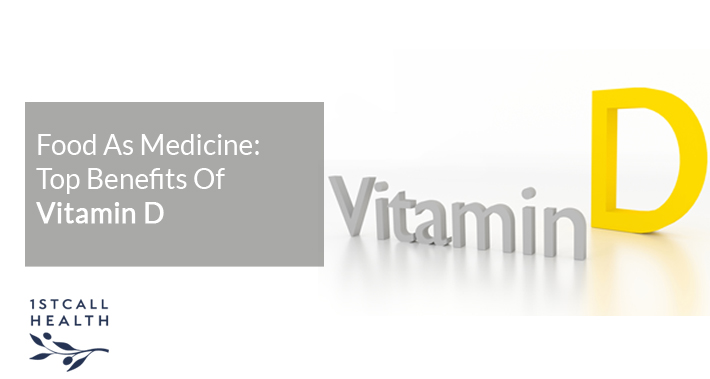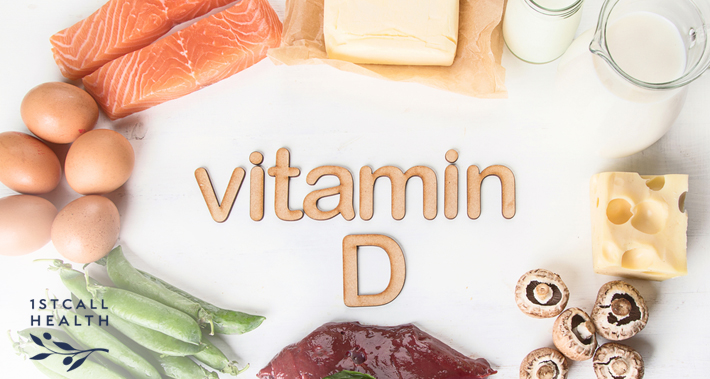
In order to survive and thrive your body needs a lot of things.
Water, oxygen, sleep, and food immediately come to mind.
And when you’re choosing food, you want to be sure you’re getting the micro and macronutrients required to help support your bodily functions.
When it comes to micronutrients – vitamins and minerals – there’s a lot to keep track of, and it can be overwhelming.
We’re a Washington DC concierge primary care clinic and we want to help you get a better understanding of the foods you can use to help keep your body healthy.
We’ve talked about nutrients before – in particular vitamin C and magnesium.
Today we’re going to take a closer look at another one of these important nutrients, what it does, and how to get more in your diet.
Keep reading to find out more about vitamin D.
What Is Vitamin D?
Vitamin D is sometimes called “the sunshine vitamin” because your body can actually produce it when your skin is exposed to sunlight.
Because of this, it’s not technically a vitamin, but a hormone.
But because it’s known as vitamin D, we’ll keep calling it that here.
It serves many vital roles in the body.
These include the regulation of the absorption of phosphorus and calcium, as well as playing an essential part in the functioning of your immune system.
It’s very important for bone strength, due to its regulation of blood calcium levels.
Even though the body can produce vitamin D after exposure to the sun, this generally does not produce adequate amounts, especially during the long, cold, winter months.
Because of this, vitamin D deficiency is quite common in this part of the world.
Dietary Sources Of Vitamin D
To add more vitamin D to your diet, consider some of these foods:
- Sardines
- Beef liver
- Egg yolks
- Canned tuna
- Cod liver oil
- Salmon
- Herring
- Mushrooms
- Shrimp
Certain types of foods have also been fortified with vitamin D.
This means it doesn’t naturally occur in that food, but has been added in during production.
These foods include cereals, milk and milk alternatives, and orange juice.
What Does Vitamin D Deficiency Look Like?
Vitamin D deficiency is very common, but the symptoms are subtle and often go undetected for a long time.
People who are at higher risk include:
- People with a darker skin tone
- Those who live in northern climates with a lack of sun exposure
- People who are breastfeeding
- Seniors
- People who are overweight, as this can limit absorption
Symptoms of vitamin D deficiency include:
- Tiredness
- Osteoporosis
- Fragile bones
- Pain in the bones
- Twitching muscles
- Muscle weakness and pain
- Stiff joints
- Anxiety and depression
Left untreated for long periods of time, vitamin D deficiency can lead to more serious complications, like:
- Autoimmune issues
- Complications with pregnancy
- Chronic infections
- Higher risk of breast and colon cancer
- Neurological issues
- Heart problems
Can You Overdose On Vitamin D?
It is possible, but uncommon, to overdose on vitamin D.
Too much vitamin D can result in high levels of blood calcium, or hypercalcemia.
Hypercalcemia can lead to the stiffening of blood vessels, and heart, kidney, and lung tissue.
It can be life threatening.
Symptoms of too much vitamin D include:
- Headaches
- Nausea and vomiting
- Constipation
- Dry mouth
- Low appetite
But it’s very difficult to get too much vitamin D through diet alone.
Usually, vitamin D toxicity happens as a result of supplementing with an extreme amount over a long period of time.

Top 5 Benefits Of Vitamin D
Vitamin D is important, not just for bone health, but it also plays a part in cardiovascular health and even weight loss.
Let’s have a more detailed look at all of the things this important vitamin can do for us.
1. It Reduces Your Risk Of Multiple Sclerosis
Multiple sclerosis (MS) is a condition which affects the brain and spinal cord.
In people with MS, the myelin sheath which protects your nerve fibers is attacked by the immune system.
This can lead to permanent nerve damage.
There is research to suggest that maintaining sufficient levels of vitamin D may protect against developing multiple sclerosis.
In addition, for individuals who already have MS, vitamin D may help reduce the prevalence and intensity of symptoms.
2. It Keeps Your Bones Healthy
Vitamin D is essential for bone health.
Your body uses it to aid in the absorption of calcium.
In addition, it helps preserve levels of calcium and phosphorus in the blood.
This is required for bone mineralization.
A 2018 study showed vitamin D levels are one of the factors which help to maintain blood levels of calcium.
3. It Supports Mental Health
If you suffer from depression or anxiety, it might be related to low levels of vitamin D.
A 2021 review by Silva Et Al identified 775 different studies about vitamin D and its relationship with mental health.
Most of the studies it looked at showed that depression and anxiety are closely related with vitamin D levels.
As well, increasing levels of vitamin D was associated with reduction in these symptoms.
4. It Reduces Your Risk Of Heart Disease
A review in Current Treatment Options in Cardiovascular Medicine noted multiple studies found vitamin D reduces the risk of heart disease as well as stroke.
Conversely, the same review found vitamin D deficiency puts you at increased risk of heart disease.
More studies in this area are needed to better understand the connection.
However, it can never hurt to ensure you’re getting enough vitamin D.
5. It Helps With Weight Loss
There seems to be a connection between vitamin D levels and weight.
Why this happens, we’re not quite sure.
Researchers think it might be related to the way vitamin D affects the formation of fat cells.
It might also be related to increased levels of serotonin and testosterone.
Vitamin D and calcium together can have an appetite suppressing effect, so it may be related to that as well.
Regardless, it’s clear that more research is needed here.
However, if you’re struggling to lose weight and keep it off, it might be worth considering your vitamin D levels.
Book Your Appointment With 1stCallHealth Today
Are you worried about nutrition?
Whether it’s vitamin D or another micro or macronutrient you’re not sure you’re getting enough of, 1stCallHealth can help.
Whether it’s for general nutrition advice, managing stress or chronic illness, or diagnosing health issues, we’re here for you.
Book your appointment with us today.
1stCallHEALTH
1331 H St NW Ste 200,
Washington, DC 20005
(202) 590-0009
– https://goo.gl/maps/MVhjkz2jqynWpsgo6
1stCallHEALTH provides affordable access to primary care services. We believe that everyone deserves affordable, high quality primary care. Our vision is to challenge the status quo, focus on the individual, and empower personal control to change the way we think about healthcare.




